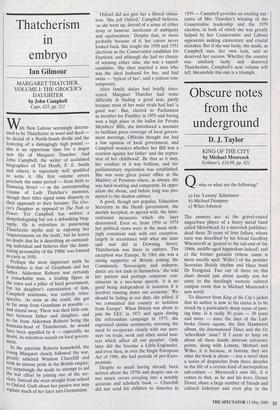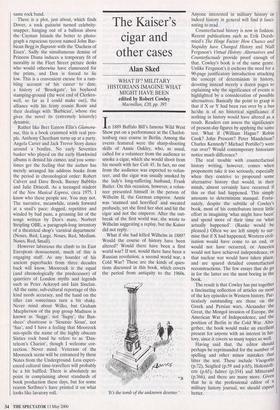Obscure notes from the underground
D. J. Taylor
KING OF THE CITY by Michael Moorcock Scribner's, £16.99, pp. 421 a) Ian `Lemmy' Kilminster b) Michael Dempsey c) Wilco Johnson The answers are: a) the gravel-voiced singer/bass player of a heavy metal band called Motorhead; b) a maverick publisher, dead these 20 years of liver failure, whose taste was described by his friend Geoffrey Wheatcroft as 'geared to the tail-end of the 1960s, middle-aged hippiedom indeed'; and c) the former guitarist (whose name is more usually spelt `Wilko') of the premier Seventies British rhythm and blues band Dr Feelgood. Two out of three on this chart should just about qualify you for entry to the dazzlingly esoteric cultural rumpus room that is Michael Moorcock's new novel.
To discover from King of the City's jacket that its author is now in his sixties is to be struck by a particularly sharp sense of pass- ing time. Is it really 30 years — 30 years and more — since the days of the Lad- broke Grove squats, the first Hawkwind album, the International Times and the Oz `schoolkids' issue? If I seem to harp on about all these faintly abstruse reference points, along with Lemmy, Michael and Wilko, it is because, at bottom, they are what the book is about — less a novel than a series of despatches from three decades in the life of a certain kind of metropolitan sub-culture — Moorcock's own life, if it comes to that, as he and his hero, Denny Dover, share a large number of friends and cultural lodestars and even play in the same rock band.
There is a plot, just about, which finds Dover, a rock guitarist turned celebrity- snapper, hanging out of a balloon above the Cayman Islands the better to photo- graph a rapacious tycoon named John Bar- bican Begg in flagrante with the 'Duchess of Essex'. Sadly the simultaneous demise of Princess Diana induces a temporary fit of morality in the Fleet Street picture desks who would otherwise have clamoured for the prints, and Den is forced to lie low. This is a convenient excuse for a ram- bling account of his career to date, a history of 'Brookgate', his boyhood stamping-ground (the west end of Clerken- well, so far as I could make out), the alliance with his feisty cousin Rosie and their dealings with 'Barbican', whose rise gives the novel its (extremely leisurely) dynamic.
Rather like Bret Easton Ellis's Glamora- ma , this is a book crammed with real peo- ple. Anthony Cheetham turns up at a party. Angela Carter and Jack Trevor Story dance around a bonfire. No early Seventies busker who played on the early Hawkwind albums is denied his cameo, and you some- times get the feeling that the author has merely arranged his address books from the period in chronological order: Robert Calvert and Dave Brock, Barney Bubbles and Julie Driscoll. As a teenaged student of the New Musical Express, circa 1975, I know who these people are. You may not. The narrative, meanwhile, crawls forward at a snail's pace: dogged, repetitive and winded by bad puns, a groaning list of the songs written by Den's mate, Norbert Stripling OBE, a paragraph-long inventory of a theatrical shop's 'carnival department' (Noses, Red, Large. Noses, Red, Medium. Noses, Red, Small).
However laborious the climb to its East European denouement, much of this is engaging stuff. As any hoarder of his ancient paperbacks from three decades back will know, Moorcock is the equal (and chronologically the predecessor) of quarriers of London myths and legends such as Peter Ackroyd and Iain Sinclair. All the same, sub-cultural reportage of this kind needs accuracy, and the hand on the tiller can sometimes turn a bit shaky. Never mind about Wilko, but Graham Macpherson of the pop group Madness is known as 'Suggs', not `Sugsy', the Ban- shees' chanteuse is `Siouxsie Sioux', not `Sue', and I have a feeling that Moorcock mis-spells the name of the highly obscure Sixties rock band he refers to as 'Dan- teleon's Chariot', though I welcome cor- rection. Never mind. Veterans of the Moorcock scene will be entranced by these Notes from the Underground. Less experi- enced cultural time-travellers will probably be a bit baffled. There is absolutely no point in complaining about standards of book production these days, but for some reason Scribner's have printed it on what looks like lavatory roll.



























































 Previous page
Previous page